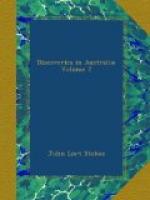DEPARTURE FROM WESTERN AUSTRALIA.
We left Swan River on the evening of the 6th of May, 1843, running out with a moderate North-East breeze. Everything seemed auspicious. The water was smooth, and the sails, as they slept in the breeze, echoed back the sounds of the well-known song, We are homeward bound, that was sung with an earnestness that could not be mistaken. I fancied I could discern, in the rough tones of the crew under my command, the existence of the same emotions that swelled in my own breast at this moment. For seamen, high and low, though content to pass the greater portion of their lives upon the world of waters, can never entirely suppress that yearning for home, which, perhaps, after all, is one of the finest traits in human nature. And now that it might be legitimately indulged, I was not sorry to see such strong evidences of its existence.
Ere the last vestige of day had passed, the coast of Australia had faded from our sight, though not from our memory; for, however much thoughts of the land to which we were returning crowded on our minds, they could not as yet entirely obliterate the recollection of that we were quitting. The Swan River colony—its history, its state, its prospects—naturally occupied much of our mind. What a change had come over it even since our visit! From a happy little family, if I may use the expression, it had grown into a populous colony, in which all the passions, the rivalries, the loves and the hates of the mother country were in some sort represented. And yet there remained still much of that old English hospitality, which rendered our first stay so pleasant, and which almost made us desire to prolong our last. The alteration that had taken place was rather to be referred to the increasing number of settlers, which rendered inevitable the formation of circles more or less exclusive, and which, with the forms of European society, promised to introduce many of its defects.
But our thoughts wandered, from time to time, over the whole of this extraordinary continent, which we saw for the first time in November 1837, at the point from which we took our departure, in May, 1843. The strange contrasts to the rest of the world which it affords were enumerated and commented upon—its cherries with their stones growing outside—its trees, which shed their bark instead of their leaves—its strange animals—its still stranger population—its mushroom cities—and, finally, the fact that the approach to human habitations is not announced by the barking of dogs, but by the barking of trees!*
(Footnote. The trees in the vicinity of houses are generally barked to obtain a covering for the roofs.)
Westerly winds carried us into the South-East trade by the 13th, in latitude 22 degrees 30 minutes South four hundred miles from the North-west Cape, when our course was directed for the Mauritius. We found the trade very squally, and on one or two occasions managed to screw as much as eleven knots out of the old craft.




